
Section 5. Key water developments in the countries of Central Asia
5.4. Turkmenistan

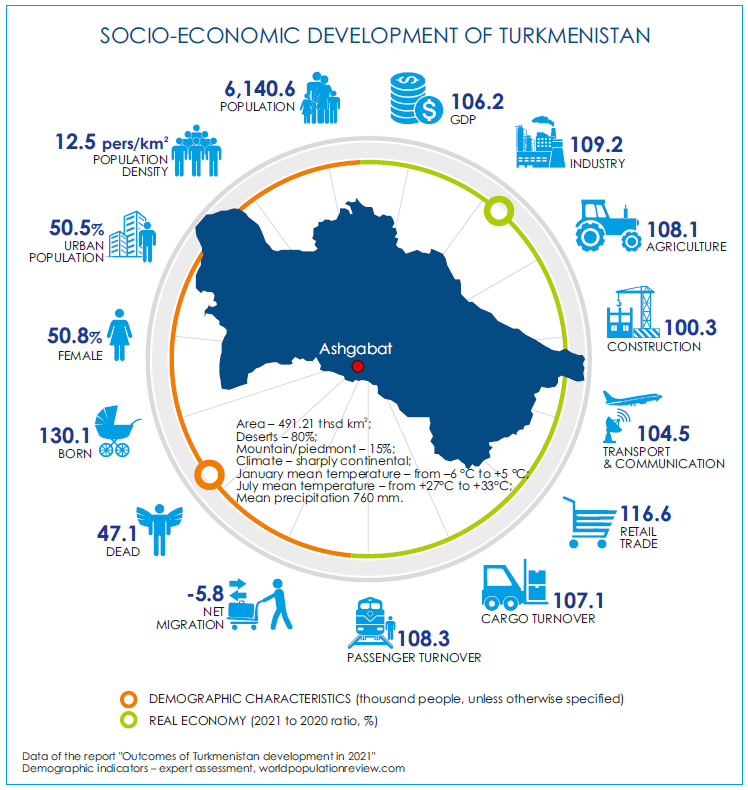
Water Sector
Water resources. The total volume of water resources of Turkmenistan is comprised of the surface runoff of the Amu Darya (88%), Murgab (6.5%), Tedjen (3.5%), and Atrek, Sumbar and Chandyr (1.4%) rivers, as well as the small watercourses of the northeast slopes of Copetdag (0.6%), and the insignificant groundwater resources and collector-drainage waters. All large rivers of Turkmenistan are transboundary, i.e. 95% of surface water in the water balance of Turkmenistan is formed outside the country.
The efforts under the Socio-Economic Development Program for 2019-2025, which envisaged measures for water saving, augmentation of water stock, prevention of salinization and reclamation of agricultural land, were continued.
A 18-million m3 reservoir was put into operation at the 1096-km of the Karakum River in Bereket district, Balkan province. The total extention of the dam and ponds is more than 7.8 km. Commissioning of the new waterworks facility with a capacity of 10 m3/s, together with road and energy infrastructure will improve the reliability of irrigation water supply in the district (August 11).
PO "Karakumderyagurlushyk" has started construction of a new reservoir (design capacity of 4 billion m3) in Lebap province. Construction of the feeder canal from the Amu Darya River 14 km deep into the territory to the west was started in 2021. Water will be diverted from the river by gravity.
Water meters have been installed at 13 points along the Murgap River in Mary province. The automated water monitoring system allows controling level and flow rate in real time.
JSC "Miwe" has been constructing a large-scale diversion structure to catch and collect mudflow from the Kopetdag mountains in Kaakhki distict, Akhal province for irrigation purposes. The structure is designed to store about 6.5 million m3 of water.
Capacity building. A number of seminars and trainings were organized and held: seminar “International experience on implementing digital technologies in the water industry” (August 10-11, OSCE Center in Ashgabat, online); training in innovative water saving methods (September 19, UNDP and “Goskomvodkhoz”,Turkmenistan, online); training in water diplomacy (November 2, Training Center for the Priority Areas of Diplomacy, Institute of International Relations at the MFA of Turkmenistan).
International cooperation. The following events were held: working meeting on water use efficiency in the region among officials and experts of the State Committee for Water Resources of Turkmenistan (Goskomvodkhoz), the Ministry of Energy and Water Resources of Tajikistan (MEWR RT) and EC IFAS (February 3, online); 1st meeting of the joint Turkmen – Uzbek Inter-governmental Commission for Water (September 13, Tashkent). See “Bilateral Water Cooperation between the Countries of Central Asia”.
The ICWC member from Turkmenistan participated at the 80th and 81st meetings of ICWC (May 11 and December 7); representatives of the State Committee for Water Resources of Turkmenistan took part in the conference "Strengthening regional water cooperation in Central Asia" (May 25, online) and the IFAS Board meeting (June 29, Dushanbe), see “ International Fund for Saving the Aral Sea”.
Projects. As a part of: (1) the "Central Asia Nexus Dialogue Project: Fostering water, energy and food security nexus and multi-sector investment” (phase II, CAREC), Turmenistan and Uzbekistan implement the demo-project “Tuyamuyun Hydroelectric Complex”. The Technical Working Group gathered together several times in the course of the year (February 23, July 23, November 2); (2) “Energy Efficiency and Renewable Energy for Sustainable Water Management in Turkmenistan” (UNDP/GEF), a scientific-practical workshop on improving the water use efficiency in irrigation systems was held online on May 26; production of two types of materials for channel lining was arranged; solar power systems were istalled for pumping and purifying water in remote villages El, Byashkak and Kelleli in Akhal province.
Drinking water supply. Implementation of the “General Clean Water Program” is continued. According to the Law of Turkmenistan on drinking water (136-IV of September 25, 2010), the Ministry of Construction and Architecture drafted the Rules of use of water supply and sanitation systems. The document provides for the regulation and accounting of supplied drinking water and discharged sewage, sets obligations, rights and responsibilities of drinking water operator and consumer.
Agriculture
At year-end 2021, Turkmenistan harvested 1.25 million ton of cotton and more than 1.4 million ton of grain, reached the state order for rice production for 82.4 thousand tons.
Latest developments in legislation. The following legal documents were adopted in 2021: (1) amended law “On state land cadaster” (416-VI of November 13), which defines the legal, economic and institutional framework of activities in the field of the state land cadaster; (2) Law «On amendments and additions to certain legislative acts of Turkmenistan» (№ 431-VI of November 13) which amended:
• The Land Code (approved by Law of October 25, 2004);
• The Law on Dayhan/Peasant Associations (113-III of March 30, 2007). The Law was supplemented by the article "Water Use by Dayhan Associations", which defines the procedure of water supply and transfer of on-farm irrigation, collector-drainage networks and associated hydraulic structures to Dayhan associations that are «responsible for the conditions and use of on-farm irrigation and collector-drainage networks, water facilities and devices, as well as for delivering water resources to respective leaseholders and other water users» and «take appropriate measures to ensure efficient and economical use of water resources», etc.;
• The Law on Dayhan Farms (445-IV of November 9, 2013). The new version stipulates that "the minimum amount of the authorized capital of a Dayhan Farm shall be 5 times the size of the base value for calculation of taxes and fees” (Article 6, paragraph 3). The Law was supplemented with the article "Water use by Dayhan Farms" also.
Agroindustry reformation and modernization under the "Program of Socio-Economic Development of Turkmenistan for 2019-2025". Private investments increasingly play the key role in developing modern agricultural production and creating new jobs. According to Resolution of the People’s Council of Turkmenistan (Khalk Maslakhaty) "On further reformation of the agricultural sector" (of September 25, 2018), land plots shall be allocated to private producers for growing crops from the ‘state order’ list in accordance with the established procedure. For instance, over 61 thousand ha of fertile land in Ruhubelent district, Dashoguz province have been allocated for a term of 99 years provided that not less than 70% of the arable area would be covered by crops.
Land and water management efficiency is improved by introducing drip and sprinkling irrigation methods. At the final meeting of the agroindustry leaders, it was proposed to reduce the area under cotton by 40 thousand ha and plant potatoes and other vegetable and melon crops on the released land.
Turkmen scientists and breeders have developed new varieties of cotton, tomatoes, watermelon and melons. Production capacities are extended: greenhouse farms equipped with the latest technologies and water-saving systems and designed for production of 8.75 thousand ton of vegetables per year were put into operation in Akhal, Dashoguz, Lebap, Mary, and Balkan provinces. As a result, about 400 new jobs were created.
Projects. As a part of the “Supporting climate resilient livelihoods in agricultural communities in drought-prone areas of Turkmenistan” (UNDP/GEF), the following events were organized: a webinar "The use of multicluster agro-ecological maps in the process of planning adaptation to climate change" (May 11); field days dedicated to rational use of irrigation water (July 15 and 24); training on the development of greenhouse facilities (August 20-21); online national workshop on the development of a system of measurement, reporting and verification (MRV) of adaptation measures, with the participation of an international expert (August 24); a seminar “The importance of modeling agroecological zones (AEZ) for the optimal placement of crops by regions of the country" (November 12). An online Roundtable discussion on the concept of a draft Law on agricultural consulting services was also organized. The participants of the Roundtable reviewed recommendations for further actions of agro-information centers, state bodies and institutions involved in agricultural consulting services to facilitate development and further adoption of the proposed legal framework (August 25).
Project “Integrated natural resources management in drought-prone and salt-affected agricultural production landscapes in Central Asia and Turkey” (CACILM-2) (FAO/GEF): field trainings were held in the format of Farmer Field School on the territory of 3 pilot regions - in the desert (on the basis of Central Karakum station, the southern edge of the Central Karakums), in mountains (Nohur, Bakharden district of Akhal province) and under oasis conditions (Gurbansoltan-eje district of Dashoguz province, Anau city, Research Institute at the Turkmen Agricultural Institute). Permanent farmer field schools are planned to be established in the three pilot regions.
International cooperation. Turkmenistan extends cooperation with FAO. Meetings were held between the FAO Sub-regional Coordinator for Central Asia, Viorel Gutu and the Deputy Prime Minister, Minister of Foreign Affairs of Turkmenistan R. Meredov (October 22, December 10), Minister of Finance and Economy of Turkmenistan M. Serdarov (December 10) to discuss partnership in the area of food security, as well as issues related to opening of the FAO office in Turkmenistan.
The following official documents were signed between FAO and Turkmenistan: (1) Country Programming Framework 2021-2025, priorities of which are in line with the state priorities of Turkmenistan and the Sustainable Development Cooperation Framework between the Government of Turkmenistan and the United Nations, 2021-2025: strengthening institutional capacity on statistical data collection and reporting on agricultural development, production, and trade; digitalization of agricultural sector, support to the country’s climate mitigation and adaptation efforts; (2) two agreements aimed at improving the cotton sector in Turkmenistan (corresponding national strategy is to be developed) and increasing the efficiency of small livestock breeding in order to reduce greenhouse gas emissions; (3) Agreement on implementation of development projects funded under the FAO-Turkey Partnership Program on Food and Agriculture.
Turkmenistan establishes cooperation with Russian agrarian universities : (1) Memorandum “On scientific cooperation and training of agrarians was signed between the Turkmen Agricultural University named after S.A. Niyazov and the Scientific and Production Seed Growing Association (Association "Semena", Moscow); (2) Memorandum of Cooperation is drafted between the Turkmen Agricultural University and the Kazan State Agrarian University in the field of education, science, culture, sports and innovations.
Events. The Conference "International cooperation in the field of food security" was held on June 25 (Ashkhabad, online). Delegation of Turkmenistan took part in the 35th session of the FAO Regional Conference for the Near East and North Africa – #NERC35 (September 21-22).
Energy
12 state power plants, with the total installed capacity of 6,511.2 MW, are operated by the Ministry of Energy. In January-October, electricity production in the country grew by 111.6% and exports increased by 134.5%. The plan was completed by 113.3 % and 178.1 % respectively.
The generating capacities of the sector are extended. A new 432-MW gas turbine power plant was completed in Lebap province. Negotiations are underway to advance construction of the Turkmenistan-Afghanistan-Pakistan-India gas pipeline and the Turkmenistan-Afghanistan-Pakistan power transmission line (January 8).
Alternative Energy
Latest developments in legislation. The law “On renewable energy sources” (337-VI of March 23, 2021) was adopted. It defines the legal, organizational, economic and social frameworks of activities in the field of renewable energy sources and regulates relations in use of renewable energy.
Implementation of national strategies and programs. The work on implementation of the State Program for Energy Saving for 2018-2024 and the National Strategy on Renewable Energy Development in Turkmenistan until 2030 has continued.
Capacity Building. Training webinar “Learning international experience in the development of regulatory technical documents for the development of renewable energy in Turkmenistan” as part of UNDP project “Sustainable cities in Turkmenistan: Integrated green urban development in Ashgabat and Avaza” (March 3); a training course to present best practices in developing target indicators for renewable energy sources in Turkmenistan (June 8-11) and a seminar on energy diplomacy (October 21-22), organized by the OSCE Center in Ashgabat.
Events. The following conferences were organized: Scientific and practical conference on green diplomacy and alternative energy development (June 12); XXVI International Conference "Oil and Gas of Turkmenistan-2021" (October 27-28).
A meeting was held with the Director General of the International Renewable Energy Agency (IRENA), Francesco La Camera on enhancing cooperation in the field of rational use of renewable and alternative energy sources (March 23).
Environment and Climate Change
Latest developments in legislation. The Law "On accession to the Agreement on the Establishment of the Global Green Growth Institute was adopted on November 13.
Amendments and additions were made to: (1) the Law "On atmospheric air protection" (429-VI of November 13, 2021). Article 7 of the Law is supplemented with the following paragraphs: "shall create forest strips to reduce the dispersion of dust and salt aerosols that have a negative impact on atmospheric air; shall study and introduce into production plant species that are more resistant to negative atmospheric conditions (dust and salt aerosols)"; (2) Law “On environmental safety” (430-VI of November 13, 2021). The law is supplemented by Chapter VI1 "Environmental disaster and emergency zones", which provides for monitoring of the ecological state and research efforts in these zones; (3) Law "On fishing and conservation of aquatic biological resources” (391-VI of June 5, 2021).
National programs. The following national programs were approved: (1) National Forestry Program of Turkmenistan for 2021-2025 and related Action Plan (June 25). The program provides for the development of a plan for planting deciduous trees, conifers, fruit trees, vine seedlings, and desert plants, the identification of key areas of international cooperation and the introduction of best practices in the forestry; (2) National Program of Turkmenistan for the Aral Sea for 2021-2025 and the related Action plan (October 22). The program provides for the modernization of land and water legislation, improvement of the system of management and use of water resources, formation of forest zones, protection of biodiversity, improvement of health service quality and implementation of preventive measures.
Implementation of the National Climate Change Strategy of Turkmenistan has continued.
Projects. (1) “Supporting climate resilient livelihoods in agricultural communities in drought-prone areas of Turkmenistan” (UNDP/GEF): the following events were organized: a workshop on the development of measurement system, reporting and verification (MRV) of adaptation measures (August 24); a five-day training “Features of atmospheric circulation and synoptic processes in Turkmenistan and neighboring states” (November); (2) “Sustainable cities in Turkmenistan: Integrated Green Urban Development in Ashgabat and Awaza”, (UNDP/GEF): a working meeting to create a platform for strategic discussions and experience exchanges in environmental protection, waste management, and natural resource management was held; local adaptation plans including local gender-sensitive aspects were developed and approved for farmers' associations and livestock farms; a training (January 19-20) and a seminar “Practical use of new laboratory equipment and capacity building of the environmental monitoring and control system” (December 7) were organized.
The following projects were launched in 2021: (1) "Capacity-building of Turkmenistan and support to the development of country programs and regional actions to address climate change" (CAREC/CCF), aimed at ensuring the country's readiness for systematic and effective interaction with the GCF in line with the established norms and procedures. A meeting was organized on the development of a project coordination mechanism (June 21-22); (2) "Developing a National Adaptation Planning Process in Turkmenistan" (UNDP/GCF) aimed at increasing the adaptation capacity and resilience of the country to climate change through the development of the National Adaptation Planning (NAP) process by integrating climate risks and building a strong evidence base for adaptation planning, including budgeting process (November 16); (3) “Conservation and Sustainable Management of Land Resources and High Nature Value Ecosystems in the Aral Sea Basin for Multiple Benefits” (UNDP/ GEF), aimed at promoting land degradation neutrality, restoration and improvement of the use of land and water resources, as well as conservation of biodiversity in the Aral Sea crisis zone in Lebap and Dashoguz provinces to enhance the sustainability and resilience of livelihoods and globally significant ecosystems. The validation workshop (February 19) and a meeting (December 17) were organized in 2021.
Events. A working meeting was held on preparation of the Fourth National Communication on Climate Change and Initial Biennial Update Report of Turkmenistan under the UN Framework Convention on Climate Change (UNFCCC), and on development of Nationally Determined Contributions (NDC) under the Paris Climate Agreement (March 10, Ashgabat, online).
The OSCE Center in Ashgabat organized seminars on issues of environmental protection system development (June 17-18), promotion of the Aarhus Convention’s principles (June 24-25), and advanced environmental management in oil and gas extractive sector (July 8-9).
The following events were organized as well: International conference “Multilateral Dialogue on the Promotion of Cooperation in the Aral Sea Basin” (April 22); Scientific and practical conference "State policy of the President of Turkmenistan in the field of environmental protection and environmental well-being: achieved milestones and tasks to be solved" (June 4); Conference organized by the UNFCCC Secretariat and the Cabinet of Ministers of Japan, with participation of representatives of environmental agencies from 45 countries in Eurasia, the Americas, and Australia; Scientific and practical conference "Current issues of Turkmenistan's transition to green technologies" (November 23).
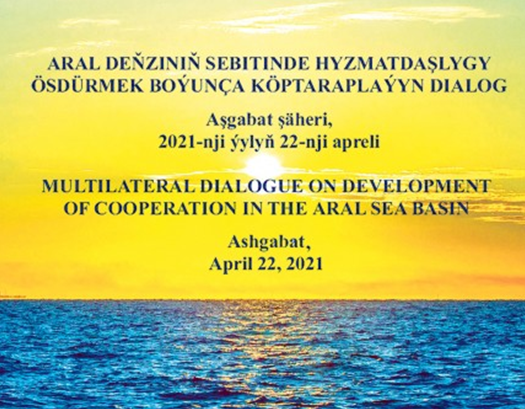
Representatives of Turkmenistan took part in the roundtable on resisting the climate change (April 21), IX Nevsky International Environmental Congress (May 27-28, St. Petersburg), the Fourth Central Asia Conference on Climate Change (CACCC-2021) (July 26-27, Dushanbe), the “C5+1” ministerial meeting (September 16), and the 26th session of the Conference of the Parties to the UN Framework Convention on Climate Change (COP26) (October 31- November 12, Glasgow, Scotland).
Emergencies
Latest developments in legislation. The following official documents were approved in 2021: (1) The Law "On the prevention and liquidation of emergency situations" (new edition) (334-VI of March 13), which establishes the legal and organizational frameworks of relevant activities; (2) The state program for implementation of the public policy on civil defense for the period 2019-2030, focusing on disaster risk reduction (DRR), formation of an appropriate legislative framework, creation of modern rapid response emergency services, strengthening of seismic safety, desertification, etc.
Drought. 2021 was the driest year in Ashgabat and a number of other regions in Turkmenistan. Ashgabat got only 61.1 mm of precipitation in the course of the year (as of December 27). Previously, less than 100 mm of annual precipitation was recorded for the capital in 2006 and 2008.
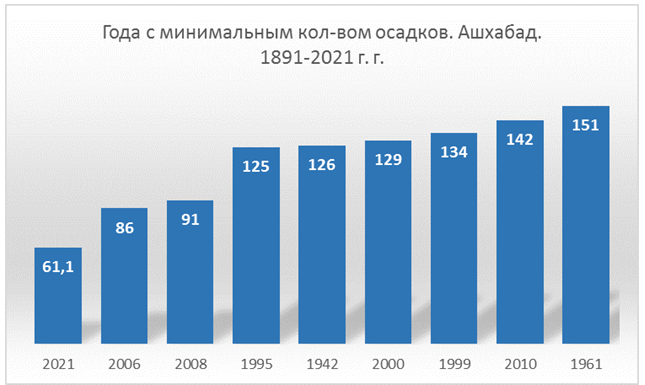
A similar situation was recorded in Serakh district, where 50.5 mm of precipitation fell (earlier, the year 2000 was considered dry – 76 mm of precipitation), and in Bairamalinsk district – 38.7 mm (the year 1917 was drier - 36 mm) and other regions.
Chauzkhan, Zeyd and Saryyazin reservoirs were shallow in 2021.
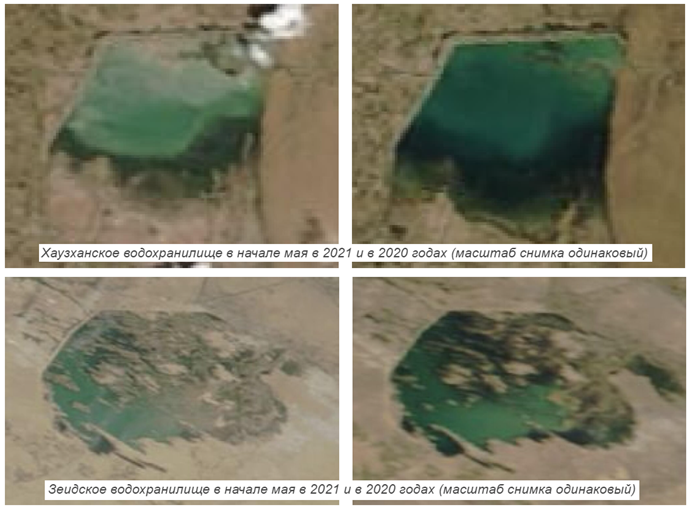
Capacity building. The Nature Conservation Society of Turkmenistan, with the support of the USAID Governance Support Program in Turkmenistan, held a series of thematic workshops on capacity building and institutional development of organizations dealing with disaster risk reduction (July 26, October 13, November 16, December 14).
SDG in Turkmenistan
The process of establishing the National Platform for collection and dissemination of the data on SDGs has been completed as part of the project “Partnering for SDG acceleration” implemented jointly by the State Statistics Committee, the Ministry of Finance and Economy and UNDP. The National platform for SDG reporting and the developed multifunctional software includes information on the country's achievements, metadata, charts, graphs and disaggregated data within SDG indicators. Also, webinars were held on “Application of public-private partnership to achieve the Sustainable Development Goals” (February 16) and “SDG Financing: Introduction to UNDP service offers and tools” (June 4).
The UN and the Government of Turkmenistan held a series of meetings to discuss the interim results of implementation of the UN Sustainable Development Cooperation Framework between the Government of Turkmenistan and United Nations, 2021-2025 (November 24-30). Joint teams of the UN and national ministries reviewed the results of the five key areas: (1) people-centered governance and the rule of law; (2) sustainable economic diversification, competitive private and financial sectors, expanded trade and its promotion; (3) disaster risk reduction, climate change adaptation and resilience (4) quality and accessible health care and social services; (5) quality, inclusive and accessible education and systems for professional development.
Young SDGs Ambassadors of Turkmenistan participated in (1) a seminar on the International Mother Earth Day, where they presented to students and schoolchildren the history of this day, told about the importance of environmental protection and the ways to maintain the ecological equilibrium (April 22). The online seminar was organized jointly by UNICEF and the Ministry of Education of Turkmenistan; (2) a Youth conference on climate held with the support of the United Nations and the British Embassy (October 8).
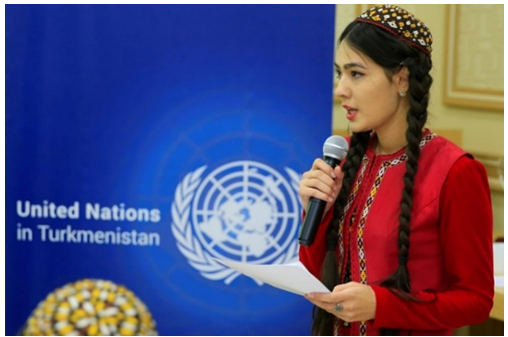
Cooperation on the Caspian Sea
Turkmenistan continues taking active part in developing the international treaty framework of cooperation, strengthening good-neighborly relations and broad cooperation between the riparian countries of the Caspian Sea. The work on preparation to the VI Summit of the Heads of the Caspian Sea States is underway. A package of new regulatory and legal documents is prepared and will be included in the agenda of the Summit. Among them are agreements on research and rescue operations in the Caspian Sea.
Within the framework of the Coordinating Committee on Hydrometeorology and Pollution Monitoring of the Caspian Sea (CASPCOM) and the Tehran Convention , Turkmenistan participated in technical meetings of the Caspian Environmental Monitoring Program (EMP) (March 5, October 12); the 25th session of CASCOM (October 25, online); the scientific conference on Climate Change in the Caspian Sea Region (October 27-28, online); a meeting of executive and operational bodies on implementation of the Protocol on Regional Preparedness, Response and Cooperation in Case of Oil Pollution Incidents (Aktau Protocol ) (November 1-3).
In cooperation with partners, Turkmenistan held: Russian-Turkmen web-conference "Ecosystem of the Caspian Sea Region" (May 12); Scientific and practical conference “Cooperation on marine environment protection of the Caspian Sea” timed to the Caspian Sea Day (August 12).
Turkmenistan took part in: a meeting of the Prosecutors General of the Caspian riparian countries, which resulted in signature of the Cooperation Declaration on environmental protection and use of natural resources of the Caspian Sea (July 7, St. Petersburg); a meeting of experts "Green economy for the Caspian Sea-2021: realities and prospects” (August 20, Astrakhan); the 14th Caspian Energy Forum (December 8, Moscow).
Foreign policy and International cooperation
In 2021, the President of Turkmenistan made official and working visits to the UAE (October), Uzbekistan (October), Tajikistan (September), Turkey (November), Russia (December).
The following high level officials visited Turkmenistan: Minister of Foreign Affairs of Uzbekistan (May), President of the Republic of Tatarstan of the Russian Federation (May, September), President of the Kyrgyz Republic (June, November), Minister of Foreign Affairs of China (July), Minister of Foreign Affairs of Pakistan (August), President of Kazakhstan (October), Presidents of Turkey, Azerbaijan, Uzbekistan, Iran, Prime Minister of Kazakhstan, Federal Minister of European and Foreign Affairs of Austria (November).
Key developments in the foreign policy of Turkmenistan
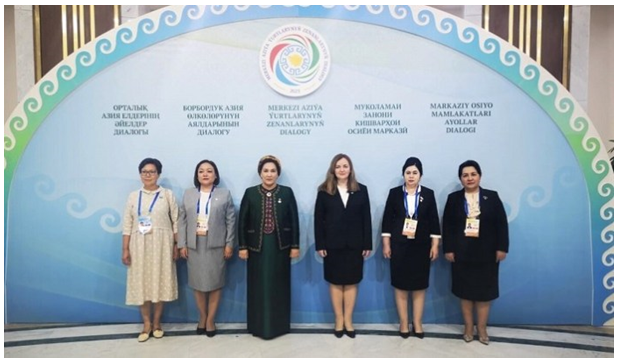
Development of alliances and strategic partnerships. Turkmenistan builds relationships with neighboring countries based on the good-neighborliness and equality principles, both in a bi- and multilateral format. In particular, cooperation is developed in energy, transport, trade, ecology, water, etc. The Consultative meeting of the Heads of Central Asian States was held in Turkmenbashi on August 6 and resulted in adoption of a Joint Statement. A number of side events included the Dialogue of Central Asian Women, the Economic Forum of the Central Asian countries, the International exhibition of national commodities of the Central Asian countries, the International festival of national dishes in the region's countries. As a result of the Dialogue of Central Asian Women, a Declaration acknowledging the position of the Dialogue to find effective ways for unlocking the scientific, technical, creative, intellectual and entrepreneurial potential of women in the region was adopted. The Joint Statement of the Heads of Central Asian States and the Declaration of the Dialogue of Central Asian Women are recognized as documents of the 75th UNGA session, published in the UN official languages and distributed among member states.
Turkmenistan, as an honorary guest, took part in: meeting of the Council of the SCO Member States (September 17, Dushanbe), XX meeting of the Council of the Heads of Government of the SCO Member States (November 25, online), meeting of Deputy foreign ministers of Central Asian countries (December 8, Dushanbe). As a member of CIS, Turkmenistan participated in the meetings of the Council of Foreign Ministers (April 2, Moscow; October 14, Minsk); meetings of the Council of Heads of Government (May 28, November 12); meeting of the Council of the Heads of State (October 15, online); informal summit of the Heads of State (December 28, St. Petersburg).
Promotion of the national interests and reinforcement of the country's image. Turkmenistan actively cooperates with the United Nations, EU, OSCE, OIC and ECO.
UN. Upon the initiative of Turkmenistan, 2021 was declared the "International Year of Peace and Trust”.
The International conference “Turkmenistan and the United Nations: Cooperation for Peace and Trust” was held on occasion of the 29th anniversary of Turkmenistan’s membership in the UN (March 2). The following bilateral documents were signed: Agreement between the Government of Turkmenistan and UNFPA on co-financing, as well as the Work Plan 2021 between the Ministry of Sport and Youth Policy of Turkmenistan and UNFPA within the framework of the project “Strengthening mechanisms of youth participation in implementation of the national youth policy and advancement of gender equality”.
The following resolutions were adopted unanimously by the initiative of Turkmenistan at the 75th UNGA: (1) Resolution "The Role of the UN Regional Center for Preventive Diplomacy for Central Asia"; (2) Resolution "Strengthening the links between all modes of transport to ensure stable and reliable international transport for sustainable development during and after the coronavirus disease (COVID 19) pandemic.
Speaking at the 76th UNGA session, the President of Turkmenistan: (1) stressed the need to intensify multilateral cooperation through scientific diplomacy and strengthen the activities of the UN; (2) proposed to develop a draft UNGA resolution on "Strengthening regional and international cooperation to ensure peace, stability and sustainable development in the Central Asian region and create a "zone of peace, trust and cooperation “Central Asia – Caspian Region"; (3) stated his intention to create a UN Special Program for the Aral Sea Basin" together with partners in the region” (September 22).
The United Nations Office for Project Services (UNOPS) was officially opened in Turkmenistan on June 10. This is a UN office that assists countries in restoring peace and post-conflict stability, provides early recovery services after natural disasters, promotes economic development based on local capacities and supports environmental sustainability as well as adaptation to climate change.
Turkmenistan has been elected (1) to the Executive Board of the UN Entity for Gender Equality and the Empowerment of Women (UN-Women) for the period 2022-2024, at the United Nations Economic and Social Council regular meeting (ECOSOC) (April 20); (2) to the post of Vice-Chairman of the United Nations Economic Commission for Europe (UNECE) for the period 2021-2023, during the 69th UNECE session (April 20-21, online); (3) to the Executive Council of the UNESCO Intergovernmental Oceanographic Commission (IOC ), during the 31st session of the Assembly of the Commission (June 21, Paris); (4) as a member of the Intergovernmental Council of the International Hydrological Programme for the period 2021-2025, during the 41st session of the UNESCO General Conference (November 18).
Ashgabat hosted an International Conference "The Peace and Trust Policy is the Basis for International Security, Stability and Development" on December 11. Finally, 26 multilateral documents have been signed. Among those were: the Memorandum of Understanding between the Government of Turkmenistan and the UN on climate change mitigation and adaptation; the Action Plan for 2022 on implementation of the UNDP program to ensure socio-economic outcomes related to climate impacts on population engaged in agricultural sector in arid regions of Turkmenistan; the Programme on developing the national adaptation planning process in Turkmenistan by the Ministry of Agriculture and Environmental Protection of Turkmenistan and UNDP Office in Turkmenistan for 2022-2024.
Turkmenistan took over the chairmanship in ECO in 2021 at the 14th ECO Summit (March 4, online). At the proposal of Turkmenistan, a resolution on cooperation between the UN and ECO was unanimously adopted at the 102nd plenary meeting of the 75th UNGA session (September 9). Turkmenistan hosted the following meetings as the chair: (1) a senior officials meeting of the ECO countries-members (November 26); (2) Business forum of the ECO member-states (November 26); (3) 25th meeting of the Council of Ministers (COM) of the Economic Cooperation Organization (November 27); (4) 15th Summit of the Leaders of the ECO member states, as a result of which the Ashgabat Consensus for Actions was adopted offering a path to regional stability and to achievement of the main goal of sustainable socio-economic development and prosperity in the ECO region (November 28).
Other organizations. The CICA Committee of Senior Officials decided to grant Turkmenistan the status of observer in CICA (June 23, Nur-Sultan, online). At the 8th Summit of the Cooperation Council of Turkic speaking states, a decision was made that Turkmenistan would join the association as an observer (November 12, Istanbul).
Sources:
The official web-sites of: MFA, State Committee of Water Management of Turkmenistan, Ministry of Justice, Ministry of Agriculture and Environmental Protection of Turkmenistan, Ministry of Energy of Turkmenistan
Information agencies: turkmenistan.gov.tm, tdh.gov.tm, turkmenportal.com, oilgas.gov.tm, orient.tm, arzuw.news, www.parahat.info